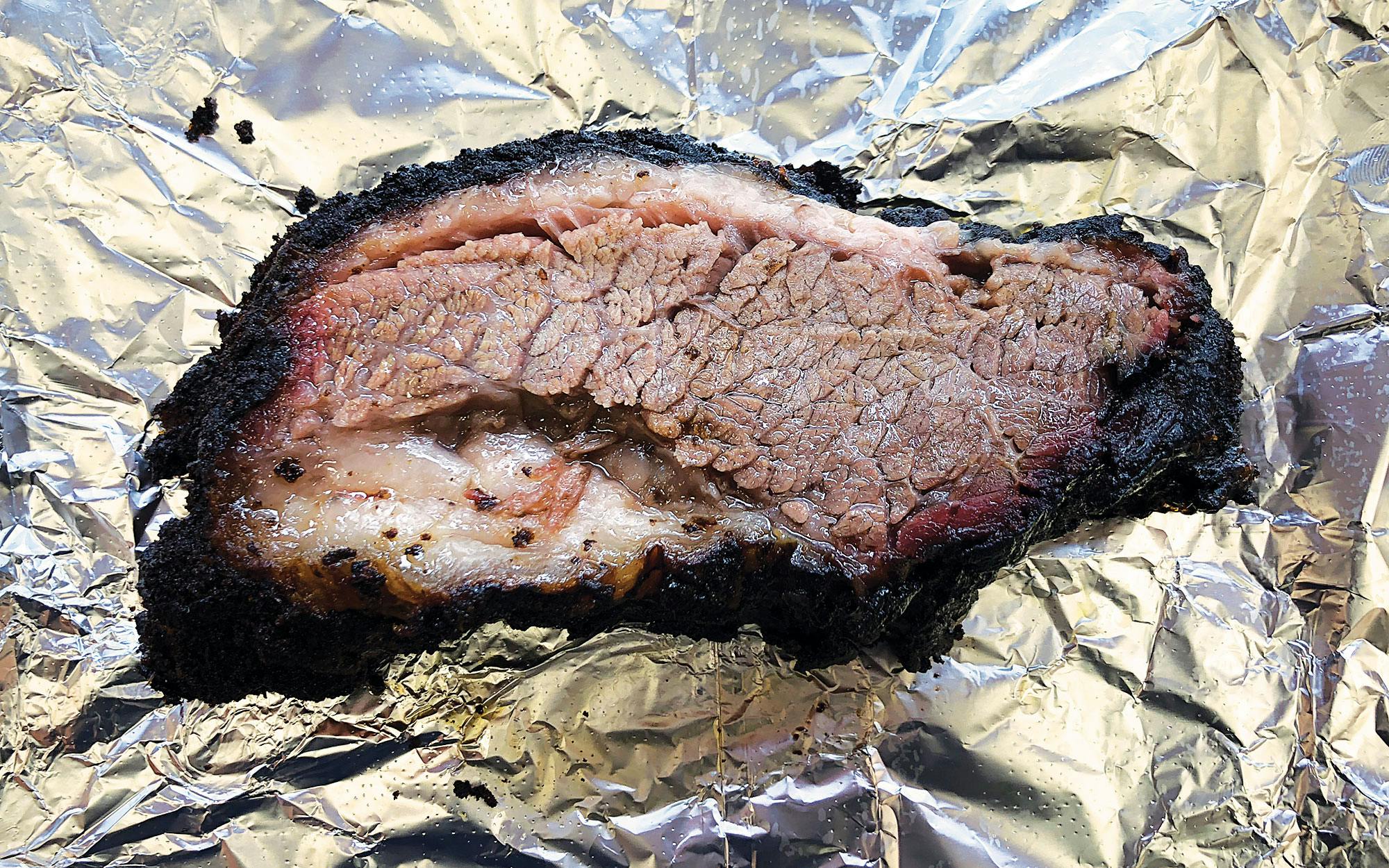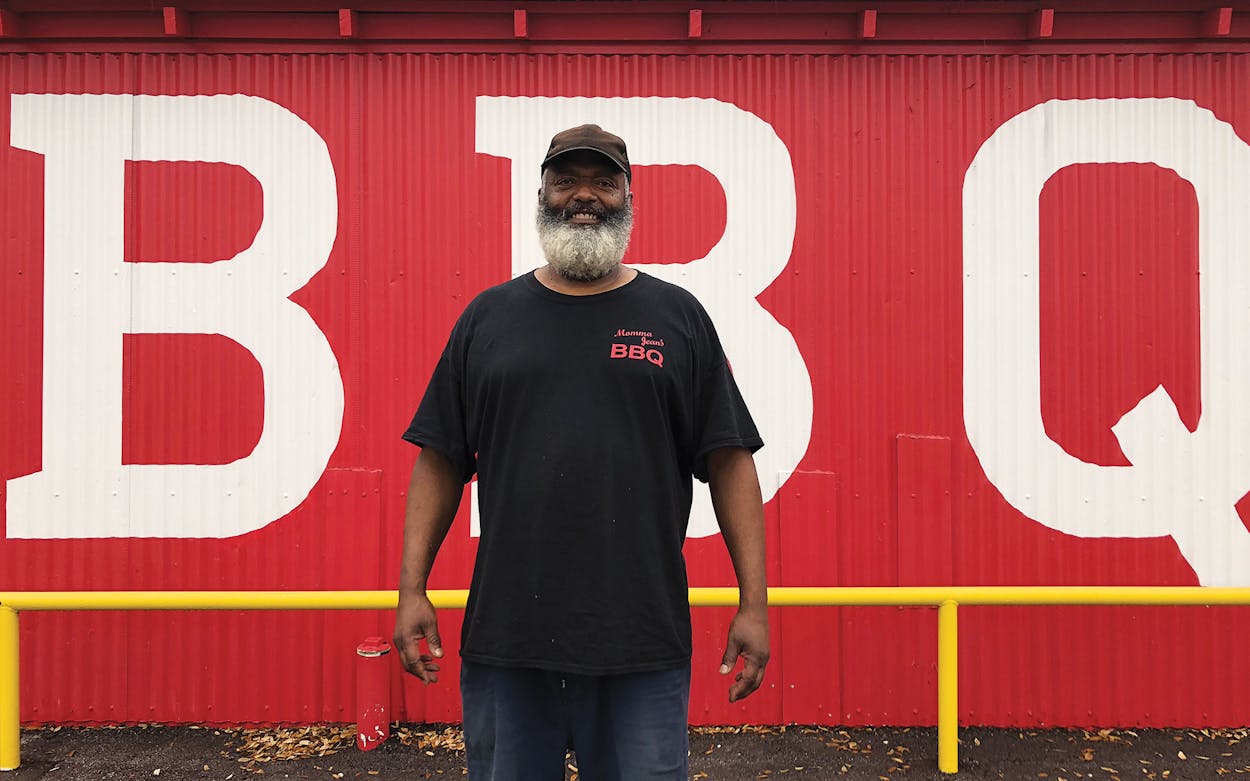Update: Owner Johnny Walker has reopened after a brief closure, and has renamed the restaurant Johnny Walker’s BBQ.
Johnny Walker was born and raised in South Dallas in the sixties. The city was so strictly segregated that the first white person he remembers seeing up close was a customer at Carter’s BBQ. “To see a white guy flip a tie up over his shoulder and talk to you,” he told me, “I’d never seen that before.” To him, this was evidence of the magic of barbecue. It brought people together, and not in the romanticized version of that notion. Barbecue caused him to interact with people he never would have otherwise. “The only other white people that would come to South Dallas were the police,” Walker says.
Now he’s a pitmaster with his own restaurant, Momma Jean’s BBQ in Lampasas, which opened a little more than a year ago. It’s named after his 89-year-old mother, who taught him how to cook. Her brothers taught him how to barbecue. They cooked whole animals over a trench in the ground; the proper heat was gauged by holding their hands over the coals. Walker has chosen to use a thermostat-controlled rotisserie. He said trying to replicate his uncles’ method in a restaurant would result in “a lot of meat over the fence.” He might have updated the equipment, but he still uses their sauce recipe and preferred wood: pecan.
Pecan is also what they used at Carter’s BBQ and Meshack’s (run by the father of Travis Mayes, who currently runs Meshack’s BBQ in Garland) in South Dallas, both of which Walker counts as barbecue influences. Sadly, James Carter passed away at 86 in 2004, and Carter’s closed before I ever got to try it. It was listed on message boards as a newly “discovered” barbecue joint just before it closed, but Carter’s contributions to Texas barbecue are largely forgotten, which frustrates Walker. He feels like too much of black barbecue history is ignored in Texas. “Back when I was growing up,” he told me, “when you went to eat barbecue in the state of Texas, if a white guy owned it, it was a black guy cooking.” (For some examples of Walker’s point, look up Orange Holloway or Houston Wright and Lucius “Lightning” Alexander.)

At Walker’s place, he keeps the menu as simple as it comes in Texas. There’s brisket, ribs, and sausage to choose from for smoked meats. The sides are just slaw, beans, and potato salad. There are no desserts, and drinks come in a can or a bottle from the cooler. A three-meat plate will set you back just $13.75.
The inexpensive menu might be scant on options, but it doesn’t lack for flavor. The potato salad reminded me of sour cream and onion potato chips. Finely chopped slaw gets a kick from black pepper, and the generous side of beans got half their weight from chopped smoked sausage mixed right in. A chunky barbecue sauce, kept warm next to the pickles and onions, is a tad sweet and acidic, with some spices I couldn’t identify. “There’s some stuff going on,” is all Walker would offer. “It’s Texas, Oklahoma, St. Louis, and Arkansas.” The surprisingly mild habanero hot sauce, tamed with pureed carrots, is a recipe from a Puerto Rican friend and his Panamanian wife. I liked it mixed in with the barbecue sauce.
A sweet and salty rub covers the ribs, which are tender and smoky. Balanced isn’t the right descriptor. It was more like the brown sugar, salt, and smoke were powerful enough to keep my taste buds in a battle, but none of them won. The commercial smoked sausage, from Slovacek’s, was also well smoked and plenty juicy. Walker prefers green pecan wood for the extra bit of smoke, and to better regulate the pit temperature. He said the dry wood he had on hand, his only option, shot the smoker temp up to 350 or 375 the previous night. I didn’t think the results should give him anything to worry about. All the brown sugar in the brisket rub made for a stout bark with a candy-like chew. The meat from the fatty end was almost creamy and soft underneath with a flavor reminiscent of salted caramel. I liked it all on its own and on the sandwich.
Walker says that not long ago, an older white customer silenced the dining room by telling him loudly, “Nobody cooks barbecue like a black man!” He figured he was supposed to be embarrassed, but it made him proud. He ignored the connotation that assumes a black man’s barbecue skills are innate rather than learned, a harmful racist stereotype, and instead thanked his uncles for sharing their knowledge, and sauce recipe, with him. Walker is about a month away from launching a line of J-Dub’s barbecue sauces in grocery stores. His barbecue education has allowed him to carry on the family barbecue legacy, and maybe get a whole new audience familiar with their barbecue contributions.
504 N Key Ave., Lampasas
512-564-1233
Tues-Thur 11-3, F-Sat 11-7, Sun 11-3
Pitmaster: Johnny Walker
Method: Pecan in a gas-fired rotisserie
Year opened: 2017
- More About:
- BBQ Joint Reviews
- Black BBQ








